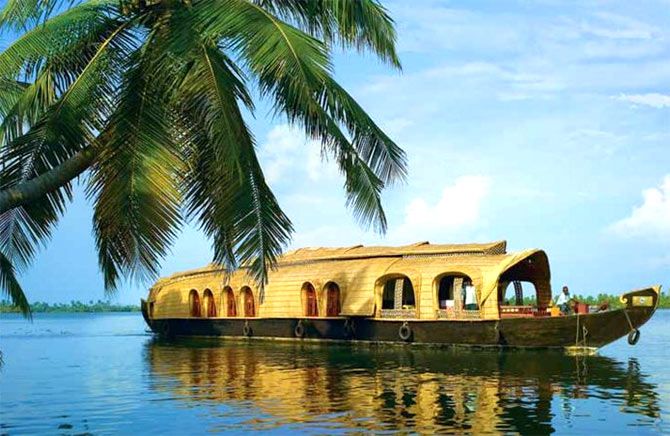
The languid Kerala Backwaters. Photograph: Kind Courtesy Kish/Creative Commons
Kerala, the state with the dubious reputation for the highest alcohol drinking rate in India, is on its way to cutting its guzzlers to size. All bars attached to hotels below the five-star category will be closed by September 12, and plans are afoot to drastically reducing alcohol consumption.
Kerala Congress President V M Sudheeran, at the head of the anti-liquor campaign, tells Archana Masih/Rediff.com why God's own country needs to get sober.
How will this ban on liquor help Kerala?
Kerala is worst affected by the excessive influence of alcohol. It is number one in per capita consumption of alcohol. There are social, financial and health concerns -- all areas of life have been very badly affected.
Most of the people who drink are suffering from various kinds of diseases. Our expenditure for the treatment of is very high. The rate of road accidents is very high in Kerala -- the rate of suicides, crimes against women and there are other social problems too.
Successive governments have been trying to reduce the consumption and availability of alcohol.
Isn't prohibition an extreme step?
It is not total prohibition. 734 liquor shops are being closed. Government outlets are there for some time.
But in ten years time, it is said, there will be total prohibition?
We have recently had a good experience. We have closed 418 liquor bars in Kerala. Even with that the social impact was so positive. The crime and accident rate has come down. Domestic violence has come down and wherever liquor shops have been closed down, the people are happy because peace of the locality has returned.
What about those who drink in moderation and are not alcoholics, won't this deprive them of their choice?
One thing I can say that in Kerala, the continuing campaign against liquor is now at a climax. Political and social organisation are all trying their best in the anti-liquor, anti-narcotics campaign. So there is a very positive result.
Our idea is to persuade them not to drink. Many people will stop drinking in Kerala.
Our idea is to curb the habit of drinking. With government action on one side and social action on the other -- we are trying our best to control the influence of liquor. We hope we can do something because if there is a will, there is a way. We are trying our best.
Won't this lead to smuggling, bootlegging, the sale of spurious liquor?
No sister, let us think positively. We will try our best. We will handle them (those indulging in black marketeering) with an iron hand. The government machinery will be alert and has been chalking out a comprehensive plan.
Many believe this will impact tourism in the state.
Tourists are coming to Kerala, not for drinking. They are coming for sight seeing. They are coming to enjoy the scenery of India (laughs).
I am sure they would enjoy a glass of wine with the scenery.
We don't think of that concept (laughs). I think Kerala will be a model. We will see our state with a new face.
Any kind of prohibition takes away people's right to choice.
The number of addicts are comparatively very less and we will treat them and rehabilitate them. But most of the people are casual drinkers, even there we never stopped the campaign. During this campaign also many stopped drinking.
In Kerala now there is a strong atmosphere against liquor and drugs.
Should not the state have worked towards bring social change aimed at the drinking problem rather than prohibition?
Our promise to the people of Kerala is to reduce the availability and the use of liquor.
Do you drink sometimes?
No, no, no. I have been fighting against liquor and drugs right from my younger days.










 © 2025
© 2025